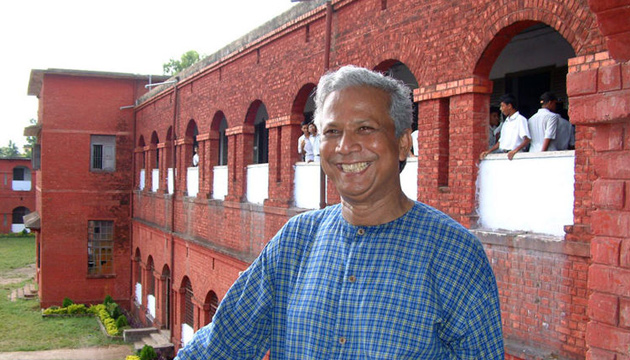Muhammad Yunus – The Guru of Micro-financing


Will you do us the honor and join our team of authors?
To write for the SohoBlog, contact us at [email protected]
(Shakespearean prose not required.)

Muhammad Yunus – The Guru of Micro-financing
Muhammad Yunus is a Bengal economist who’s considered to be the father of modern micro-financing. He is the founder and managing director of Grameen Bank, which pioneered microcredit, a banking method where small loans are granted to the poor, without collateral, in order to help them rise above the poverty threshold. In 2006 he won a noble prize, along with Grameen Bank, for his work and contribution in micro-financing. He is also the author of three successful books, the founder of several companies that address poverty and development issues in Bangladesh, the recipient of numerous other international awards and a member of the board of the UN foundation.
Yunus was born in 1940 in the village of Bathua, in what was then Eastern Bengal, to a successful Goldsmith. Growing up, Yunus, the third of 14 children (of which five died in infancy), saw his mother helping every poor person that came knocking on their door, never turning them away. He studied Economics in the University of Dhaka, and soon after getting is MA at the age of 21 he began teaching Economics at Chittagong University. In 1965 he won a scholarship to Vanderbuilt University in the US and there he obtained his PhD. Upon completing his PhD and after spending a few years in Middle Tennessee State University as an assistant to an Economics professor, Yunus - inspired by the birth of Bangladesh, decided to return to Chittagong University.
During a class trip to the village of Jobra, near the University, Yunus talked to women selling bamboo furniture and learned that most of their profit margins are spent covering loan payments with high interest that they take to purchase the bamboo from which they make the furniture. It was there that he realized the potential and significance of microcredit and small business loans. That same day he lent $27 to 42 people in the village and thus began his microloan project to the poor of Bangladesh. A project that went unsupported by the government and the banks for many years until finally, in 1983, he secured credit from a major bank and founded Grameen Bank (which means “Village Bank”).
As of today, Grameen has over 2,500 branches, serving over 80,000 villages. 97% of the clients are women and over 97% of the loans are paid back, the highest recovery rate in the banking system. Grameen methods are also applied in projects in 58 countries worldwide.
So what does a Bengal economist and the system he developed to originally finance some of the poorest people in the world has to do with you? The latest global financial crisis highlighted the strength that lies within Micro-finance, and in particular – microcredit and small loans. Think about the battle to end recession in military terms. Today, almost every general will tell you that the best way to win a war is “from the bottom-up”, by winning the hearts and minds of the common people, the wrongly named “insignificant” individual citizens. Microcredit puts the faith and the spotlight back where it should belong - small business owners. It reinforces the belief that economies (especially struggling ones) can be stirred to safety by focusing on the micro aspect of the economy, rather than the macro aspect of it. At the end of the day, small businesses owners are a component of the economic system, and small business loans might kick-start a spark of initiative that will carry growth upwards. It will create jobs and increase personal consumption - the corner stone of a healthy and sustainable economic growth.
|
|
|